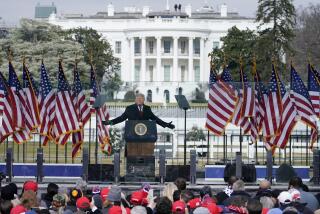House Approves Amendment to Ban Flag Desecration
With a profusion of patriotic rhetoric, the House Wednesday approved a constitutional amendment giving Congress and the states authority to ban desecration of the U.S. flag.
Calling Old Glory “the most profound and revered symbol of our national unity,” Rep. Charles T. Canady (R-Fla.), the measure’s floor manager, said the flag is “a national asset which deserves protection from physical desecration.”
The amendment’s opponents, mostly Democrats, were no slower in professing their love of the flag or their distaste for “idiots” who desecrate it. But they strongly opposed amending the Constitution in a way that they said would allow restrictions on free speech and expression.
“It makes me sick to see anyone burn the flag,” said John Lewis (D-Ga.). “But the Bill of Rights protects that [act]. We must not choose the symbol over the real thing.”
It was clear from the debate’s beginning, however, that arguments based on constitutional principles had no chance against the appeals of the amendment’s champions.
The vote on the constitutional amendment was 312 to 120, with 93 Democrats joining 219 Republicans in the majority, while 12 Republicans sided with 107 Democrats and the chamber’s lone independent in opposing the measure. Support from at least two-thirds of all House members--290--is necessary to pass a constitutional amendment.
The amendment is the Republican majority’s response to Supreme Court rulings in 1989 and 1990 that struck down federal and state statutes prohibiting flag desecration, holding that those laws infringed upon one’s right to free speech and expression under the First Amendment.
Since then, 49 state legislatures have called on Congress to submit to them a flag desecration constitutional amendment. But before state legislatures can act, the measure must pass the Senate by a two-thirds majority, something that is far from certain.
As Senate Majority Whip Trent Lott (R-Miss.) conceded, surmounting that obstacle would be “a big day’s work.” And shortly after the House vote, Sen. Paul Simon (D-Ill.), a strong amendment foe, declared: “This is one of those situations where we have to go against public opinion.”
Rep. Gerald B. H. Solomon (R-N.Y.), chairman of the Rules Committee, said Senate GOP leaders have counted 64 solid votes for the amendment, leaving just three more senators to be rounded up. But, according to the Congressional Monitor, a daily newsletter, 34 senators--the number needed to stop the amendment--either voted against such an amendment in 1990 or have said they intend to oppose it this year.
If approved by the Senate, at least 38 of the 50 state legislatures must ratify the amendment within seven years for it to take effect.
The Clinton Administration recently came out against the amendment, arguing that it would be wrong to alter the Bill of Rights over an act that rarely occurs.
The amendment as passed by the House is just 21 words long. It states: “The Congress and the states shall have the power to prohibit the physical desecration of the flag of the United States.”
Canady, in an interview after the vote, said that the margin of victory was “stronger than we anticipated” and that the overwhelming show of support will “enhance our position” in the Senate.
In three hours of debate on Wednesday, backers and opponents of the measure resorted to not only florid words but also a variety of red-white-and-blue props to help enliven their remarks.
Shortly before balloting, Rep. Randy (Duke) Cunningham (R-San Diego) had to choke back tears during a brief floor speech while recounting the experience of a friend who was an American prisoner of war in Vietnam.
During the man’s prolonged captivity, Cunningham said, he painstakingly sewed a flag onto the inside back of his shirt. And during meetings with fellow POWs, he would display the flag.
Eventually, his captors spotted the flag and severely beat the man, according to Cunningham. When the guards shoved him back into his cell, the man was literally crawling on his hands and knees. Yet he spurned assistance from other POWs and instead began gathering material to begin sewing a new flag, Cunningham said.
Under the constitutional amendment, states would be free to define desecration, a provision to which many Democrats vigorously objected, saying that it could lead to 50 different laws.
Opponents also said that states could come up with varying definitions of what constitutes a flag, such as whether flags depicted on clothes, posters or buttons also would be protected by the desecration law.
Rep. Zoe Lofgren (D-San Jose) expressed concern that she might be subject to arrest under such a new law because she was wearing a flag tie and similarly designed earrings. Rep. Patricia Schroeder (D-Colo.) wondered if the cancellation of a postage stamp that depicted the flag would constitute flag desecration.
Before the amendment’s adoption, the House overwhelmingly rejected a Democratic attempt to define “desecration” as “burning, trampling, soiling or rendering.”
Rep. Anthony C. Beilenson (D-Woodland Hills) said flag-burning “is [an] unpopular expression, but it deserves expression no matter how much we deplore it.”
But Rep. Floyd Spence (R-S.C.), echoing many others, insisted that flag desecration is no more a free-speech right than “throwing a bomb into a building.” Rep. Bill Baker (R-Danville) argued that flag desecration was “beyond free speech” and said the amendment is “about the preservation of a great experiment in liberty.”
More to Read
Get the L.A. Times Politics newsletter
Deeply reported insights into legislation, politics and policy from Sacramento, Washington and beyond. In your inbox three times per week.
You may occasionally receive promotional content from the Los Angeles Times.






